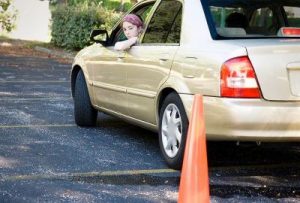 National Teen Driver Safety Week is October 15-21, 2017. While parents should continually remind their teenagers about safe driving habits, National Teen Driver Safety Week is an excellent opportunity to discuss safe driving practices and ways to limit driving distractions with your teen.
National Teen Driver Safety Week is October 15-21, 2017. While parents should continually remind their teenagers about safe driving habits, National Teen Driver Safety Week is an excellent opportunity to discuss safe driving practices and ways to limit driving distractions with your teen.
Learning how to drive is a rite of passage for teenagers. However, with the privilege of driving (yes, driving is a privilege and not a right) comes a tremendous amount of responsibility. Teen drivers must remember that once they are behind the wheel, they need to pay attention not only to the behavior of other drivers, but they must also think about their own actions.
Consider these numbers from the Michigan Office of Highway Safety Planning:
- In 2015, there were 41,961 Michigan car accidents with a driver age 15-19.
- These crashes resulted in 84 fatalities and 477 serious injuries. This number is up from 2014, when there were 40,865 crashes with a driver age 15-19, resulting in 69 fatalities and 479 serious injuries.
Talk To Your Kids About Teen Driver Safety
Unfortunately, only 25 percent of parents have had a serious talk with their teenagers about the key components of driving. More parents need to discuss teen driving safety because parents actually have more influence over their teenagers’ driving habits than anyone else.
Parents: take the time to talk with your teens about the rules of the road and the dangers of distracted driving. Texting while driving, talking while driving, taking photos while driving and perusing social media are just some ways your teen driver can become distracted, when their concentration should be on the road and getting from point A to point B.
In fact, it is illegal in Michigan for teen drivers with a Level I or Level II driver’s license (i.e., a learner’s permit) to use a cell phone while driving. This includes making calls, receiving calls, texting, using an app or searching the Internet. (Note: It is against the law for all Michigan drivers to text while operating a motor vehicle, no matter what their age.)
In addition, driving with friends in the car is a huge distraction. Michigan law imposes certain restrictions on the number of passengers a Level I or Level II driver may have with them in the vehicle. So be sure to talk to your kids about how many passengers they may have in the car and under what circumstances.
Michigan also has a zero-tolerance law when it comes to alcohol and teenage drivers. Teens can automatically lose their driver’s license if they consume alcohol and operate a motor vehicle. It’s important to note that teens can also lose their license for having unopened alcohol present in a vehicle.
Teen Driver Safety And Parent Responsibilities
In Michigan, vehicle owners are liable for damages if the person driving the vehicle is determined to be the at-fault driver in a crash.
For parents, this means if your teen is operating a vehicle owned by you (the parent), then you (the parent) can be held responsible for paying damages if someone was injured in the car accident, if the teen was at fault for the crash. What kinds of damages could the parent be liable for paying? Non-economic damages, like pain and suffering, and economic loss damages, including the out-of-pocket expenses that aren’t covered by the injured person’s insurance.
Further, parents must remember to include their teenage driver on their auto insurance policy. Yes, it will increase your premium a bit, but it’s worth the extra cost. This way, if your teenager is injured in a Michigan car accident and is on your policy, then he is entitled to no-fault PIP benefits. It’s important to note that, if you don’t add your teenage driver to your auto insurance policy and your teen is in a crash, then your insurance company may be able to void the entire policy.
Other reasons to add your teen driver to your no-fault insurance policy: it’s the law; it’s considered fraud if you don’t; and your teen driver can be fined and/or lose his license for driving without required insurance.
In this video, Grand Rapids car accident attorney Tom Sinas discusses teen driver safety in Michigan.
Teen Driver Safety Resources
Numerous resources are available to help parents discuss driving safety with their teenagers.
The National Highway Traffic Safety Administration (NHTSA) has compiled a fact sheet that details a number of useful tips for parents. The NHTSA has also launched a “5 to Drive” campaign, which highlights five of the most dangerous behaviors in which teen drivers engage.
In Michigan, the Office of Highway Safety Planning has a teen driver safety program in state high schools called “Strive For a Safer Drive” (S4SD). The program seeks to reduce the number of fatal traffic crashes among teenagers by promoting conversations among teens about the issue.
Auto insurance companies also have apps and programs that help promote safe driving among teenagers. Check and see if your insurance carrier has any programs.
If you or a family member have been injured in a Michigan car crash, contact our Lansing auto accident attorneys and Grand Rapids car accident lawyers for a free initial consultation.
